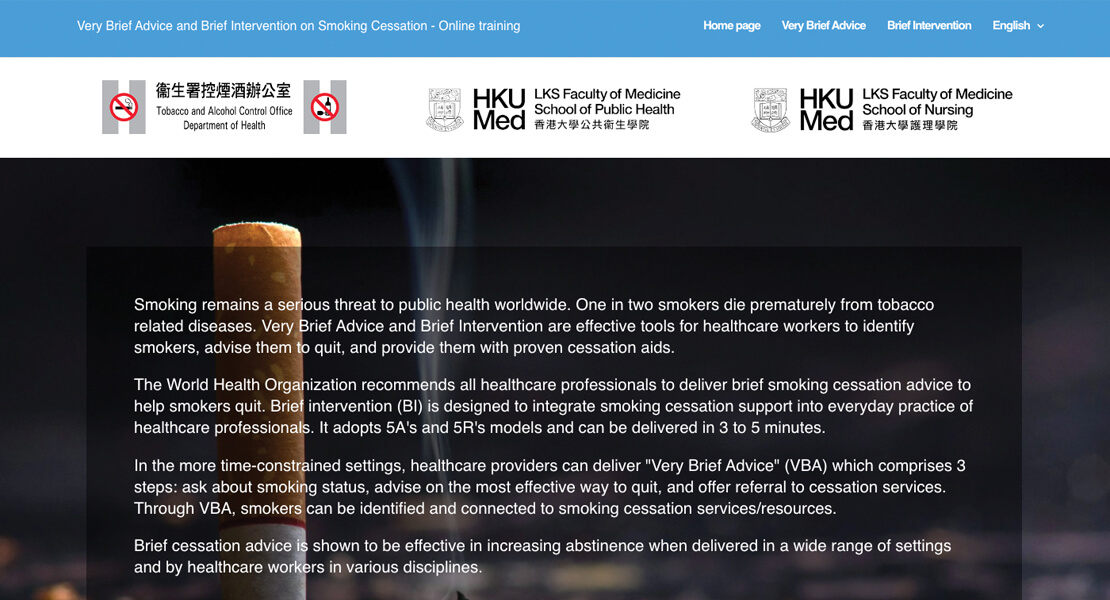
Research
Online Platform Trains Professionals to Deliver Proven Benefits of Brief Smoking Cessation Advice
Dr Derek Cheung Yee-tak | Assistant Professor
Smoking is a serious threat to global public health. Although the smoking rate in Hong Kong has been continuously declining, there are still more than 600,000 daily smokers here and the related economic loss is about HK$10 billion every year. One in two smokers will die prematurely due to tobacco use, yet quitting smoking can reduce the risk of many types of cancer, stroke, heart disease, lung disease and diabetes. Smoking cessation is achievable with the determination to quit smoking and evidence-based treatments.
The World Health Organization has recommended that all healthcare workers provide patients with brief smoking cessation advice to encourage smokers to quit. However, most healthcare workers ignore the importance of this and do not know how to encourage smokers to quit. To address that gap, we conducted a recent large, multisite, pragmatic randomised controlled trial (RCT) that showed smoking cessation advice of even one-minute or less – including questions about smoking status, a brief warning, and referral – can effectively improve the smoking cessation rate of smokers. In particular, an intervention as short as 30 seconds increased self-reported abstinence among mainly male smokers in China at the 12-month follow-up (risk difference = 1.3%). The intervention (versus control) group also showed greater self-reported 7-day abstinence [9.1% versus 7.8%, odds ratio (OR)=1.14, 95% confidence interval (CI)=1.03-1.26, P=0.008] and 30-day abstinence (8.0% versus 6.9%, OR=1.14, 95% CI=1.03-1.27, P=0.01) at 12-month follow-up.1 Numerous studies have also demonstrated that brief smoking cessation advice by health care professionals or trained cessation ambassadors can reduce the frequency of cigarette consumption, increase quit motivation, and improve the smoking cessation success rate.
Given the limited interaction time that medical personnel have with each patient, short and effective interventions are more feasible than intensive interventions. Health professionals can also repeatedly remind patients to quit in each follow-up. Very brief smoking cessation advice is a clinical behavioral intervention that requires less than three minutes to encourage smokers to quit.
Our research team, together with the Tobacco and Alcohol Control Office of the Department of Health, has developed an online training platform to provide teaching materials and demonstration videos for medical staff to help them quickly grasp the requirements of giving very brief smoking cessation advice. This advice can be delivered by every healthcare provider to help all smokers quit. Our website also includes handouts for easy reference, and after completing the course, learners can take the self-assessment questionnaire to earn Continuing Medical Education Credit (CME/CNE). Finally, the training platform also provides practical guidelines and smoking cessation leaflets to facilitate implementation in clinics.
If all health professionals can encourage and help smokers quit smoking during medical diagnosis and treatment, this can increase the quit rate and improve their health and quality of life. In contrast, if health professionals do not say a word about smoking cessation, the patient may misunderstand that their smoking is not a problem.
Online Training Platform: https://vba.nursing.hku.hk/Reference:
- Cheung YT, Jiang N, Jiang CQ, Zhuang RS, Gao WH, Zhou J, Lu JH, Li H, Wang JF, Lai YS, Sun JS, Wu JC, Ye C, Li N, Zhou G, Chen JY, Ou XY, Liu LQ, Huang ZH, Ho SY, Li HCW, Su SH, Yang Y, Jiang Y, Zhu WH, Yang L, Lin P, He Y, Cheng KK, Lam TH. Physicians' very brief (30-sec) intervention for smoking cessation on 13671 smokers in China: a pragmatic randomized controlled trial. Addiction. 2021 May;116(5):1172-1185. Available from: doi: 10.1111/add.15262. Epub 2020 Oct 5





